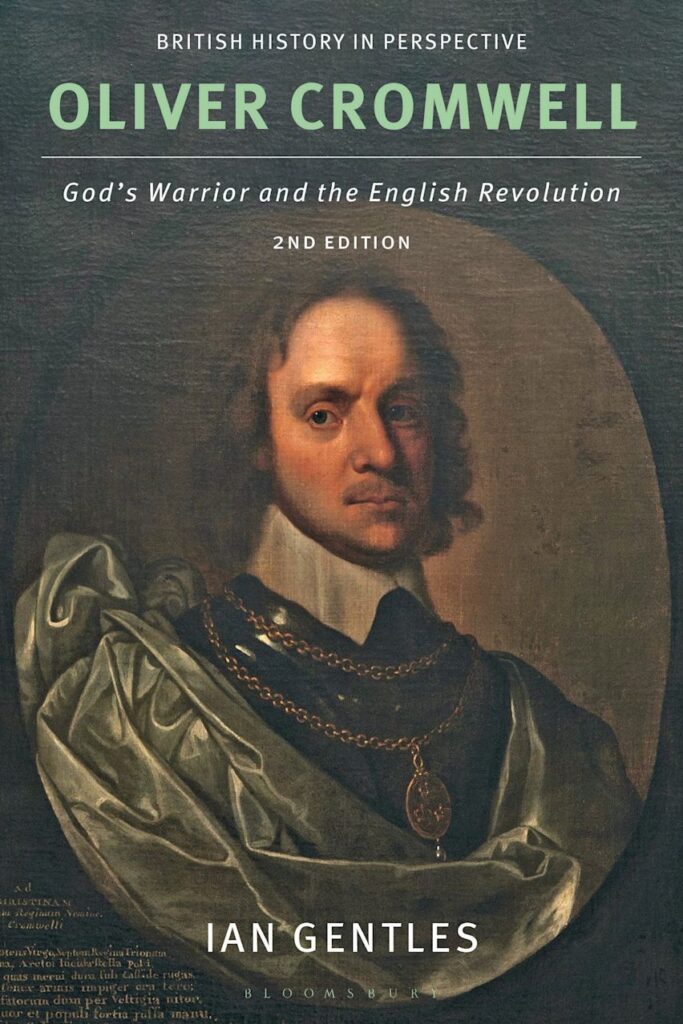IAN GENTLES
Bloomsbury Academic
£28.99
ISBN 9781350375864
REVIEWED BY
John Morrill
John Morrill is Emeritus Professor of British and Irish History, Selwyn College, Cambridge, and Hon. Fellow of Trinity College, Dublin.
This is a modestly revised version of a biography first published in 2011. Ian Gentles is a Canadian who wrote a Ph.D in London in the 1960s on the sale of Crown lands (to support the Army) in the 1650s, and in addition to many articles he has written three major books: The New Model Army: agent of revolution (1992; 2022); The English revolution and the War of the Three Kingdoms (2007); and this book on Cromwell. I wish that he had stuck to the ‘Three Kingdoms’ rather than the ‘English revolution’ subtitle, not least because he does treat Cromwell’s relationship with Ireland and Irish affairs more thoroughly than many others.
Those who acquired the first edition of this book will probably not need to acquire this new edition. A great many footnotes have been updated (first and foremost by changing references to the previous editions of Cromwell’s recorded words to the new Letters, writings and speeches of Oliver Cromwell, gen. ed. John Morrill (3 vols; Oxford, 2022; vol. 2 reviewed in HI 31.4, July/Aug. 2023)). He has added notes reflecting other new work and conversations with other scholars, but the text itself—with one exception—is little changed. As far as I can see there are about twenty adjusted sentences, several to take account of changes that he made in his impressively radical revision of The New Model Army. The exception is that he has replaced a single paragraph about the deeply flawed ‘Western Design’ (a.k.a. the ‘Hispaniola expedition’) of 1655 with a six-page account that would have been improved by a reading of Jonathon Riley’s The Colonial Ironsides: English expeditions under the Commonwealth and Protectorate, 1650–1660 (Helion, 2022).
There is no shortage of biographies of Cromwell. I have 28 on my shelves, 22 published since I was a student! What is distinctive about this one? It is a more holistic life, including more about his family life, the extent of his wealth and how he managed it, his work in the marriage market, his passion for horse-breeding and his patronage of poets and painters. It offers an especially close analysis of his unrivalled ability to make friends and enemies. It gets beyond the visionary godliness to explore his ruthless opportunism. Gentles has little new to offer on Cromwell’s political career or religiosity and religious policies, and unsurprisingly little distinctive to say about his military career except for a close attention to his subject’s close attention to logistics and supply chains. It helps to explain the ‘successes’ of Cromwell’s campaigns.
All this is handled with skill and clarity and this biography could be called the work of a critical friend. Readers of History Ireland might be most interested in Cromwell’s role in Irish affairs. There are two sections in the biography relating to that. There is sound coverage of his very active role in the Long Parliament’s committee for Irish affairs in the twelve months following the outbreak of the Ulster Rising of October 1641 and of the unresolved matter of just how much he invested in the Irish adventure, committing him to the confiscation of vast amounts of Irish land once the ‘rebellion’ was put down. The latest research suggests that the inconsistency in the evidence arises from the fact that one list is of sums that he offered to invest and the other of the amount that he actually paid in.
Later there is a lean and clear twelve-page account of his Irish campaigns of 1649–50, with a good lead-in on the thoroughness of his preparations across the spring and summer of 1649 before his departure. There is disappointingly little on his role in 1647 as the Army revolted against being sent to Ireland, and a rather bitty account of the settlement and governance of Ireland in and after 1652, and his failure to manage the feud between overlapping governorships by his son-in-law, Charles Fleetwood, and his son, Henry. Still, Gentles worked profitably in the archives in Dublin; he did discover the fascinating records of courts martial in Dublin (1651–3), which he co-edited for Archivium Hibernicum (vol. 54, 2011), and his account of the campaigns follows in content and tone Micheál Ó Siochrú’s God’s executioner (2008) more than any other source. That is good practice. He uses a lot of value-laden words (‘infamy’, ‘reprehensible’, ‘the moral low point of his life’ [p. 105]). Fair enough, you may say, but it leads him into rather too casually adding some colourful detail that he ought to know has very dubious lineage. Was Sir Arthur Aston really beaten to death with his own wooden leg? And, more seriously, he really should have known that it is wrong and, indeed, pernicious to write that those not ‘decimated’—i.e. not amongst the one in ten clubbed to death (to save bullets)—were sent as slaves to Barbados. They weren’t—they were sent as indentured servants. This matters because of the foul slur by American racists that white slaves coped with slavery better than black slaves. I would add that his final peroration (p. 198) is an important lament that Cromwell, in his relations with the Irish, was all too typically an Englishman of his time. He may carry primary responsibility for Drogheda and Wexford, but others need to be named and shamed for the so-called ‘Cromwellian settlement’.
So, a good read but not a great one.

